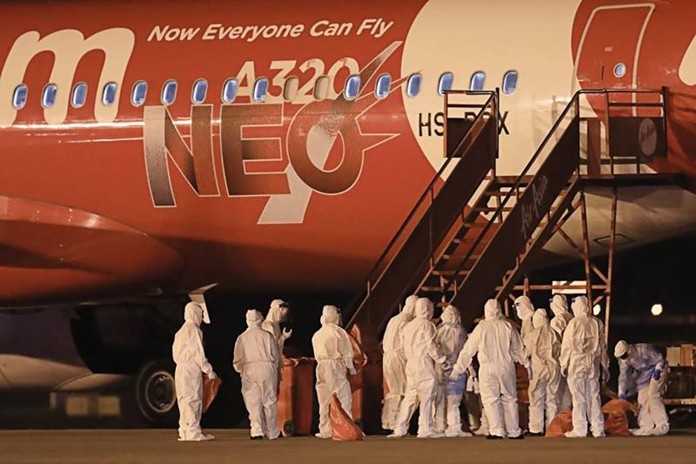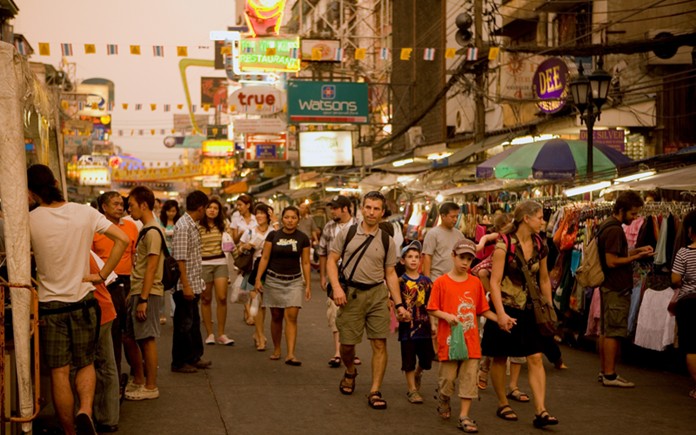
In the never-ending crusade to think of ideas to reopen Thailand to leisure tourism without incurring a second coronavirus wave, the Ministry of Health has now proposed that short-term international tourists may be able to travel in supervised groups during their 14-day quarantine on entry. This would be a variant on the Alternative State Quarantine (ASQ), which requires an isolated stay in a registered hotel, but the new tourists would not be confined to their room but allowed to venture outside on local escorted tours to places of interest such as spas, monuments and restaurants. Everyone back in the bus please.
The visitors would be required to use tracking devices and would be accompanied on a 24/7 basis by Covid-19 medical agents. Chonburi province, which hosts the struggling seaside resort of Pattaya, has been mentioned as a possible location for a trial run. This is apparently because the province already has substantial experience of handling the quarantine of new arrivals at Suvarnabhumi airport. There are several Pattaya hotels which are registered for that purpose.

However, the notion of welcoming international tourists under such close supervision and monitoring has been dubbed the “North Korean” model because visiting foreigners on group tours there are allowed little or no freedom of movement with compulsory outings to local sites favoured by the Pyongyang regime. North Korea has suspended these tours for the duration of the pandemic.
The latest proposal to restart leisure tourism in Thailand is one of a handful of ideas, none of which has yet been formally introduced. Last July there was talk of travel bubbles and green zones with neighboring countries which did not materialize after sudden virus outbreaks in China and Vietnam. They were followed by the Snowbird concept in which longstay visitors would be welcomed as escapees from cold winters in Europe and elsewhere, but the practicalities proved too difficult. One unpopular suggestion had been that they wear an ankle tracking bracelet 24/7.
Finally the STV (Special Tourist Visa) program was introduced formally on October 1 but, to date, has seen no actual arrivals. The stated reasons have been administrative blockages, confusion over registration or even the need to postpone the initiative until the annual vegetarian festival in Phuket has passed. Certainly the STV scheme in its detail remains a masterpiece of ambiguity for the general public.
All the above schemes have been for groups presumably arriving on charter flights, but only from countries with a good track record of handling the virus. China in other words. All the proposals have envisaged expensive medical insurance, frequent Covid-19 testing prior to arrival and during the holiday, computerized or electronic tracking and a variant of “soft” quarantine for the first fortnight.
Greg Harris, a British travel agent and Association of British Travel Agents spokesman, said, “It’s a case of too many proposals from different government ministries which are then discarded or fall into oblivion.” He added that the possibility of Brits having a holiday in Thailand before the end of the pandemic or mass vaccination were remote, especially as the UK was experiencing a serious hike in the number of infected people.
Thailand has admitted about 22,000 foreigners since the partial reopening of air travel in June. All of them have needed to apply for a certificate of eligibility from their local Thai embassy which in turn requires voluminous paperwork. The main categories of permitted arrivals have been work permit holders, aliens with a Thai spouse, medical tourists, investors, Elite visa holders and the super-rich under several headings including ownership of property. Retirees are also now allowed to return provided they obtain the O/A annual visa with the necessary income and insurance cover. But no tourists please.
 |
 |
 |





